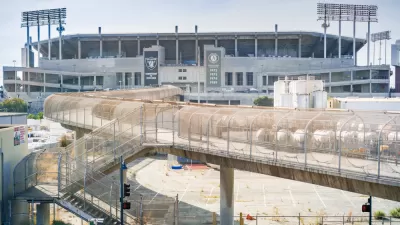Under intense political pressure to retain the full application of the CA Environmental Quality Act to CA High Speed Rail project, Gov. Brown withdrew his proposal to allow the project certain exceptions to lawsuits.
With legislators due shortly to vote to authorize $2.7 billion from the $9.95 billion 2008 High Speed Rail bond act, the relief from environmental lawsuits intending to slow the project proved secondary to getting the legislature to authorize the state funding. Ralph Vartabedian and Chris Megerian describe the circumstances surrounding the Governor's change of mind.
"It appeared that the proposal was jeopardizing support for the rail project from the environmental movement, a stalwart supporter of high-speed rail along with labor unions and big engineering firms.
The Sierra Club and the Natural Resources Defense Council raised objections to Brown's proposal, saying it was part of a pattern to water down one of the most important pieces of environmental law in history.
Kathryn Phillips, director of Sierra Club California, said the rail project was exactly the type of major construction that the environmental laws were intended to address...Phillips said it would now be appropriate for the Sierra Club to support the appropriations for starting construction, since the group was a backer of the original bond proposal that was passed by voters in 2008."
The legislature had qualms about providing the environmental exceptions.
"Sen. Joe Simitian, (a key Democrat representing three San Francisco Peninsula cities that are suing the High Speed Rail Authority) said there wasn't "a lot of stomach" for Brown's proposal among his colleagues in the Legislature.
"I think that's wise," Simitian said. "It was a bridge too far. The obvious question is, is this a decision for the long term, or will the issue of environmental exceptions be revisited in the near future? That's a question people are going to ask."
Thanks to MTC Library
FULL STORY: Gov. Jerry Brown to scrap environmental exception for bullet train

Planetizen Federal Action Tracker
A weekly monitor of how Trump’s orders and actions are impacting planners and planning in America.

Restaurant Patios Were a Pandemic Win — Why Were They so Hard to Keep?
Social distancing requirements and changes in travel patterns prompted cities to pilot new uses for street and sidewalk space. Then it got complicated.

Map: Where Senate Republicans Want to Sell Your Public Lands
For public land advocates, the Senate Republicans’ proposal to sell millions of acres of public land in the West is “the biggest fight of their careers.”

Orange County, Florida Adopts Largest US “Sprawl Repair” Code
The ‘Orange Code’ seeks to rectify decades of sprawl-inducing, car-oriented development.

Maui's Vacation Rental Debate Turns Ugly
Verbal attacks, misinformation campaigns and fistfights plague a high-stakes debate to convert thousands of vacation rentals into long-term housing.

San Francisco Suspends Traffic Calming Amidst Record Deaths
Citing “a challenging fiscal landscape,” the city will cease the program on the heels of 42 traffic deaths, including 24 pedestrians.
Urban Design for Planners 1: Software Tools
This six-course series explores essential urban design concepts using open source software and equips planners with the tools they need to participate fully in the urban design process.
Planning for Universal Design
Learn the tools for implementing Universal Design in planning regulations.
Heyer Gruel & Associates PA
JM Goldson LLC
Custer County Colorado
City of Camden Redevelopment Agency
City of Astoria
Transportation Research & Education Center (TREC) at Portland State University
Camden Redevelopment Agency
City of Claremont
Municipality of Princeton (NJ)



























